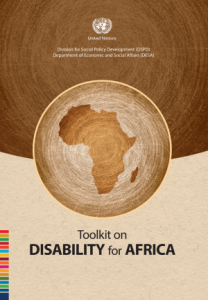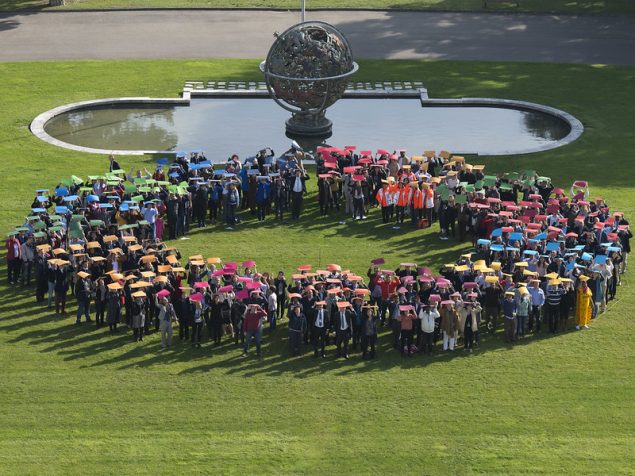United Nations Headquarters, Conference Room 7 (NLB), 1 March 2012, 1.15 – 2.30 p.m.
(Flyer for the event)
Unedited CART Transcript
The General Assembly has reiterated the urgent need to include disability in the international development agenda, and has identified the strengthening of the collection and compilation of national data on the situation of persons with disabilities as a means to achieve this goal (see resolutions 63/150, 64/131 and 65/186). In his report to the fiftieth Session of the Commission for Social Development (E/CN.5/2012/6, paragraph 67), the Secretary-General also called for increasing efforts to apply the internationally recommended guidelines, principles and methodologies for collecting and analyzing data and statistics on disability.
Disability continues to remain largely invisible in most mainstream development processes. However, some progress has been made in strengthening the knowledge base on the situation of persons with disabilities and this contributes to the mainstreaming of disability and the effective formulation of disability-inclusive monitoring and evaluation of the internationally agreed development goals, including the Millennium Development Goals (MDGs). Better information on the situation of persons with disabilities is urgently needed to prevent development progress from perpetuating barriers to participation and inclusion of persons with disabilities, and to help towards the overall objective of equalization of opportunities.
Background
In September 2013, the General Assembly will convene a High-level Meeting with the overarching theme “The way forward: a disability inclusive development agenda towards 2015 and beyond”. In accordance with General Assembly resolution 65/186, the Report of the Secretary General (A/66/128) provided information on possible outcomes for such a meeting. These included a commitment to the allocation of adequate resources for improved collection and analysis of data and statistics on the situation of persons with disabilities as they relate to the MDGs and other internationally agreed development goals.
As a contribution to the preparatory process and the envisaged outcomes of the High-level Meeting, DESA is organizing a series of panel discussions on disability data and statistics. The first two of these interactive panel discussions were held on 2 December 2011 at UN Headquarters in New York as part of the programme to commemorate the International Day on Persons with Disabilities 2011. (Panel 1: Towards inclusive development: improving data and statistics on disability and Panel 2: Mainstreaming disability in the global development agenda: experience in other development issues). The two panels, which focused on improving disability data and statistics, recognized some of the challenges in standardizing the measurement of disability statistics and highlighted the efforts and progress made in building collaborations to promote internationally comparable disability data.
Continuing on with the series and in conjunction with the 43rd Session of the Statistical Commission (28 February to 2 March 2012), a panel discussion will be organized by DESA on 1 March in collaboration with other stakeholders under the theme “Disability data and statistics for inclusive development: next steps for action at national, regional and global levels”.
Panel Discussion
The panel discussion will contribute towards sustaining the effort from all actors to improve statistical capacity with regard to disability, and to promote evidence-based planning, implementation, monitoring and evaluation of policies on disability.
The panel will discuss the importance of data and statistics on disability to promote inclusive development policy and programming at national and international levels. It will review existing recommendations for improving the availability and quality of data on disability and explore some of the common obstacles and challenges in gathering reliable data on disability.
The panelists will look at the experience of countries in collecting data and statistics on disability and explore the role of international cooperation in promoting internationally comparable data and statistics on disability. The panel will also will consider options for a global report on disability and discuss strategies with which to integrate disability into existing global reports on development.
The panel is organized by UN DESA and co-sponsored by the Permanent Mission of Argentina to the United Nations, the Permanent Mission of the Republic of the Philippines to the United Nations and the Permanent Mission of Sweden to the United Nations. The event is held in collaboration with the World Bank and the Washington Group on Disability Statistics.
For inquiries related to this panel discussion, please contact Ms. Shifaana Thowfeequ, UNDESA (thowfeequ@un.org).
Welcome Remarks:
Ms. Akiko Ito, Chief, Secretariat for the CRPD, Division for Social Policy and Development, UN DESA
Moderator:
- Ms. Jennifer Madans, Associate Director for Science at the National Center for Health StatisticsWashington Group on Disability Statistics
Panellists:
- Ms. Aleksandra Posarac, Lead Economist and Team Leader of the Disability and Development Team at the World Bank
- Ms. Ana Maria Edwin, Director of the National Institute of Statistics and Census (INDEC) of Argentina
- Mr. Romulo Virola, Secretary General of the Philippine National Statistics Coordination Board
- Mr. Arvid Linden, Head of Division of Analysis, HANDISAM, Swedish Agency for Disability Policy and Coordination
- Ms. Margarita Guerrero, Director, Statistical Institute for Asia and the Pacific, Economic and Social Commission for Asia and Pacific (ESCAP)
Other resources
- Disability and Statistics: Disability-inclusive design, planning, monitoring and evaluation
- Guidelines and Principles for the Development of Disability Statistics
- Principles and Recommendations for Population and Housing Censuses
- Washington Group on Disability Statistics (see also Washington Group on Disability Statistics (US-CDC))
- World Bank: Data and Statistics on Disability
- ILO: Statistics on the employment situation of people with disabilities




